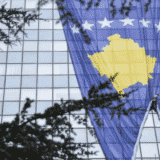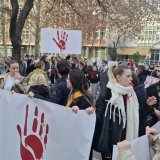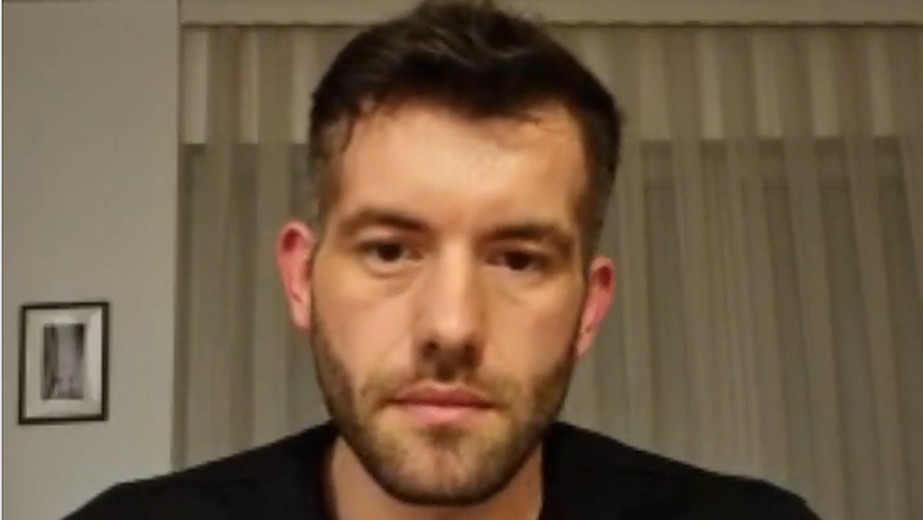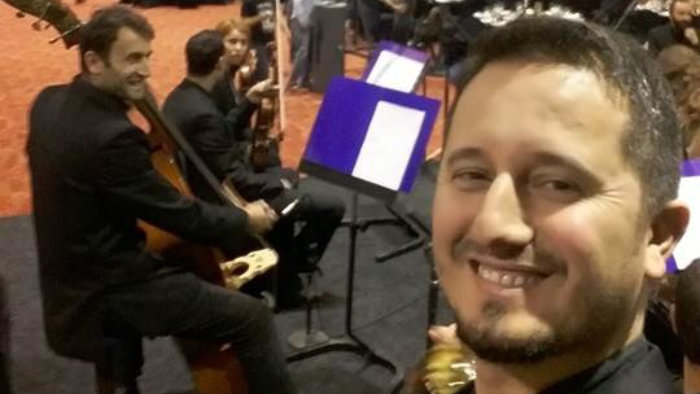
Uvek se dobro osećam kada sviram sa svojim kolegama, bili oni Srbi, Hrvati, Bosanci ili Makedonci, nije važno. Svi smo jedna melodija. Za nas nema granica ili politike.
To poručuje Festim Fanaj, koncert-majstor Kosovske filharmonije, u intervjuu u sklopu projekta portala Danas „Druga strana Kosova“.
- Pitanja novinara Danasa
Šta bi, prema Vašem mišljenju, trebalo najpre i prioritetno učiniti kako bi se odnosi Srbije i Kosova normalizovali?
– Kao prvo, treba da se svi probudimo iz sna.
Kako ocenjujete proces normalizacije koji trenutno vode vlasti u Prištini i Beogradu?
– Za normalizaciju treba da imamo normalne ljude.
Da li je moguće da proces normalizacije odnosa Kosova i Srbije okončaju političke elite koje su bile aktivne tokom sukoba devedesetih godina?
– Oni treba najpre da osnuju jedan muzički bend, i da krenu da vežbaju, svaki dan. Bez dirigenta i bez zvučnika. Da ne bi svakodnevno „trubili turbo-folk ideje“. Ja bih im preporučio „smooth chill out“ muziku.
- Pitanja koja je postavio muzičar Marko Dabetić /netlabel 93dot93

Šta je sve potrebno da biste mogli da zaradite za život kao neko ko svira klasičnu muziku na Kosovu?
– Ovde na Kosovu kao i svugde na svetu, a posebno na našem Balkanu trudimo se na mišiće i dušom, kako se na mom jeziku kaže, da preživimo od plate, za koju treba minimum 16 godina da se studira, dakle odmalena, i to ako sve ide po planu. Inače, studiranje zna da potraje i do 20 godina sa magistraturom. Sada su plate povećane i za nekog ko hoće neki normalan život je možda okej. Ponekad nam bude plaćen neki koncert u okviru nekog festivala, ali to je sitnica u poređenju sa tim kakav intelekt, talenat i rad treba da investiraš da postaneš muzičar u sveukupnom smislu, violinista ili nešto drugo. Međutim, da bi živeo neki normalan život, onda treba da aktiviraš sve motore, pa možda čak da zaboraviš na sebe ili porodicu na tom putu. Neko se pored klasike bavi “tezgama” po džez, folk i pop svirkama, gde god pronađe sebe.
Prema Vašem mišljenju, da li je na Kosovu dovoljno prepoznata i institucionalno podržana vrsta muzike kojom se bavite?
– Do pre nekoliko meseci bili smo u štrajku. Eto koliko institucije, to jest politika brine o nama.
Za koga biste rekli da predstavlja Vašu ključnu publiku na Kosovu?
– Oko polovinu naše publike čine profesionalni muzičari koji dolaze da nas slušaju. Međutim, u poslednje 3-4 godine imamo mnogo mlade publike kao i takozvanu “Golden Age“ generaciju, od 35 do 55 godina, koji dolaze na koncerte Filharmonije. Publike ima, ali mi trenutno nemamo koncertnu dvoranu.
- Pitanja koja su postavili naši čitaoci na društvenim mrežama
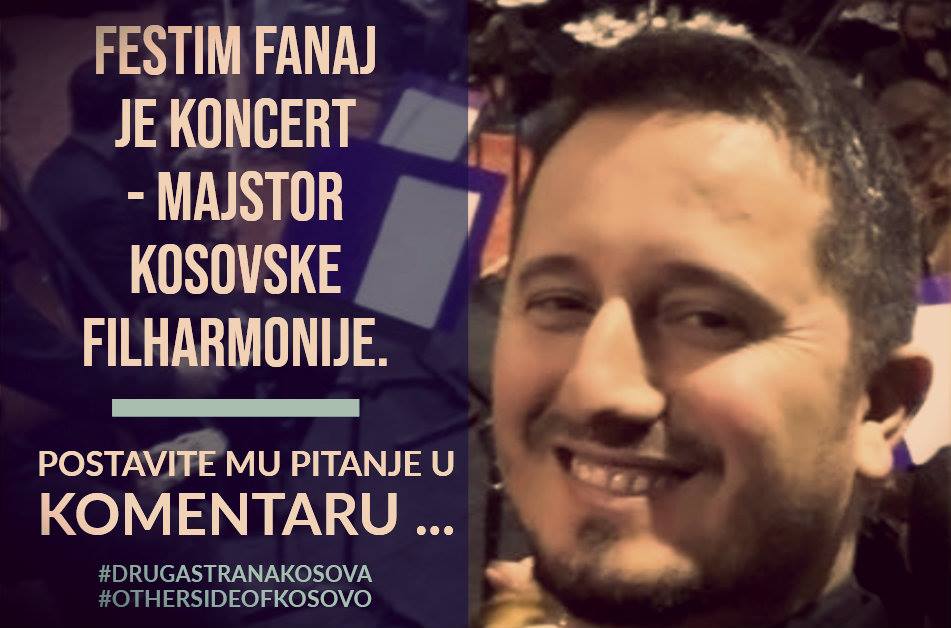
Kolika je odgovornost biti koncert-majstor Filharmonije Kosova?
– Kao u svakoj instituciji, i u Filharmoniji mora da postoji i disciplina i odgovornost. Kao “lider” imaš taj osećaj da se sve vrti oko tebe. Bilo da si strog, ili kad si malo opušteniji, osećaš krivicu ako izostane dobar rezultat. Na tebe gledaju kao na uzora. Ja volim da vodim orkestar u muzičkom smislu, ali sa time dolazi i odgovornost; da budeš prvi, u ovom slučaju prva violina, nije teško, već sam se navikao na to.
Da li biste učestvovali na nekom festivalu u Srbiji?
– Rado. Već sam bio u Srbiji. Ja sam inače, pored Filharmonije Kosova, član i “Orkestra bez granica”, poznatijeg kao “No Border Orchestra“, i u njemu sam od osnivanja. Odličan dirigent Premil Petrović je osnivač tog orkestra i ja sam sa oduševljenjem prihvatio poziv da budem član tog divnog sastava koji sačinjavaju muzičari sa prostora bivše Jugoslavije. Imali smo koncerte u Sava centru, na Kolarcu i u Novom Sadu. Uvek se dobro osećam kada sviram sa svojim kolegama, bili oni Srbi, Hrvati, Bosanci ili Makedonci, nije važno. Svi smo jedna melodija. Za nas nema granica ili politike.
Kako da bolje upoznamo kosovsku kulturu i umetnost?
– Znamo da nije isto kad gledamo neku utakmicu na televiziji ili kad smo na tribinama. Možemo putem Jutjuba da saznamo nešto više, ali ništa nećemo osećati i zaista saznati jedni o drugima dok se ne vidimo u Prištini ili Beogradu.
***
ENGLISH VERSIO
I feel good whenever I play together with my colleagues, no matter if they are Serbs, Croats, Bosnians or Macedonians. We are all the same melody. There are no boundaries or politics for us, says Festim Fanaj, the leader of Kosovar philharmonic orchestra, in the interview within Danas portal project “Other Side of Kosovo”.
- Questions asked by musician Marko Dabetic/netlabel 93dot93:
What conditions should be fulfilled in order for you to earn your living as someone who performs classical music repertoire in Kosovo?
Here in Kosovo, like all around the world, specially on the Balkans Peninsula of ours, we do our best with “the muscles and soul”, as it is said in my language, to survive on the wage which one can earn only after at least 16 years of studing, or in other words, after learning from an early age, providing that everything has gone according to the plan. But studing might last for up to 20 years if master degree is included. The wages have been increased and they might be now OK for someone who wants lo live some kind of normal life. We are from time to time payed for some concert performance within some festival, but it is a trifle in relation to the intellect, talent and work one should invest in order to become a musician in general sense or a violinist or something else. However, in order to live some kind of normal life, you should activate all “engines” and on that course you might even neglect yourself or your family. Besides classical music performances, some people moonlight at the jazz, folk and pop gigs, wherever they find their true self.
In your opinion, is the music you perform sufficiently recognized and institutionally supported in Kosovo?
We were on strike till several months ago. This is how the institutions, or in other words politics take care of us.
Who is your main audience in Kosovo?
Professional musicians who come to listen to us account for 50 percent of our audience. But in last three or four years many young people and the members of the so-called Golden Age generation, who are between 35 and 55 years old, also attend the concerts of the philharmonic orchestra. We have the audience, but we do not have a concert hall in this moment.

- Questions asked by our social networks followers:
How much does the job as the leader of Kosovar philharmonic orchestra bear the responsibility?
The discipline and responsibility must prevail in the philharmonic orchestra like in any other institution. As the leader of the phiharmonic orchestra you have the feeling that everything depends on you. No matter if you are strict or slightly relaxed, you feel guilt if the positive result has not been achieved. They consider you an example. I like to lead the orchestra in the musical sense, but it also bears the responsibility.
Would you participate in some festival in Serbia?
Gladly. I have already been in Serbia. Besides being the member of the Kosovar philharmonic orchestra I have also been the member of No Border Orchestra since its establishment. Excellent conductor Premil Petrovic established that orchestra and I gladly accepted the invitation to join that wonderful music group that consists of the musicians from the territory of the former Yugoslavia. We held concerts in Save Center, Kolarac and in Novi Sad. I feel good whenever I play together with my colleagues, no matter if they are Serbs, Croats, Bosnians or Macedonians. We are all the same melody. There are no boundaries or politics for us.
How can we acquaint ourselves better with Kosovar culture and art?
We know that watching the sport’s game on TV and watching it from the grandstand is not the same thing. We can learn something more about it through the Youtube but we will feel nothing and we will not really learn anything about each other till we meet in Pristina or Belgrade.
https://www.instagram.com/p/BxfFL9_pmOb/
- Questions asked by Danas journalist:
What, in your opinion, should be prioritized first and foremost in order to normalize relations between Serbia and Kosovo?
All of us should be awoken from our dream first and foremost.
What do you think about the process of normalization that is currently being led by the authorities in Pristina and Belgrade?
We should have normal people in order to achieve the normalization.
Is it possible that the normalization of relations between Kosovo and Serbia might be achieved by the political elites that were active during the 1990s conflicts?
They should firstly establish the musical band and start rehearsing every day, but without the conductor and loudspekers in order not to “trumpet turbo-folk ideas”. I would recommend them to perform “smooth chill out” music.
Pratite nas na našoj Facebook i Instagram stranici, ali i na X nalogu. Pretplatite se na PDF izdanje lista Danas.

